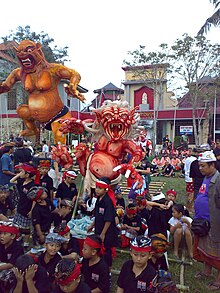Nyepi
The effect of these prohibitions is that Bali's usually bustling streets and roads are empty, there is little or no noise from TVs and radios, limited access to Internet and few signs of activity are seen even inside homes.
Although they are free to do as they wish inside their hotels, no one is allowed onto the beaches or streets, and the only airport in Bali remains closed for the entire day.
[5] The indirectly-state-owned consumer communications provider Telkomsel shuts down all internet access, while privately owned ISPs remain operational.
[6][7] On the day after Nyepi, known as Ngembak Geni (Relighting the Fire), social activity picks up again quickly, as families and friends gather to ask forgiveness from one another, and to perform certain religious rituals together.
After the Ogoh-ogoh have been paraded around the village, they are burned in the cemeteries although many are displayed in front of community halls for another month or more and sometimes even purchased by museums and collectors.
[18] National police also take part, but naturally ultimately report to Jakarta rather than the village or regency level.


